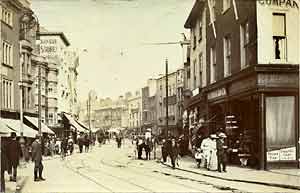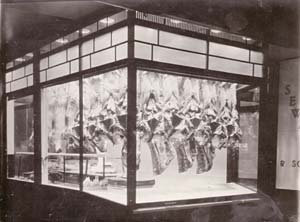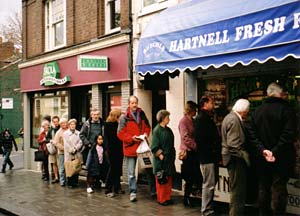
- Home
- Memories
- Scrapbook ▽
- Topics ▽
- People ▽
- Events
- Photos
- Site Map
- Timeline
Return to Retail Exeter
A little way down Longbrook Street, opposite where the old Theatre Royal was situated can be found one of Exeter's most successful independent food retailers, Hartnell's Fresh Foods. With its smart blue and white awning, the Tardis interior contains a mouth watering selection of fresh meat, bread, fruit and vegetables that could not be purchased in a single shop when the premises first opened in 1890 as Hutchings and Son, butchers at 4 Eastgate.
Mr Albany Hutchings had been an auctioneer before he opened his business at Eastgate. Mr Hutchings also owned a slaughterhouse in Smythen Street, the traditional centre of butchery in Exeter, probably in the area that was once known as Butchers Row. There was enough hanging space for ten sides of beef and a dozen sheep. Stables in Trinity Mews and a field in Wonford, for keeping animals after their purchase at market or directly from the farm, completed Mr Hutchings little empire. This was a different era from the modern, factory prepared, plastic wrapped joints of the supermarket, a time when the customer was only too aware of the source of their food from the many animals led through the streets of Exeter, to the small, privately owned slaughterhouses that not only smelled unpleasant, but were often noisy and dirty.
The shop was next to Boons, also a butcher, which was itself, next to the Cathedral Dairy just opposite the New London Hotel. Business did well, and in 1898 Mr J D Seward was engaged as manager and in 1902, he moved to live over Eastgate at his marriage. Shortly after their first son was born, Mrs Seward joined her husband in the business, looking after the accounts from the desk for a joint wage of 35 shillings per week.
Time rolled on and Britain was at war - in 1916, Mr Hutchings died and left the goodwill of his business to Mr Seward. Rationing had been introduced that was not nearly so well organised as it was during the Second War, but by 1918, business started to return to normal. Sheep and cattle could again be purchased directly from the farm on a dead weight basis, or from market, when quality cattle could be purchased for £20 per animal.
The firm became a truly family business when Mr Seward's son, L J Seward joined his father in the shop in 1926 and in 1932, he became a partner. Mr Seward senior prospered and in 1934 he attended the meeting in Plymouth of the Federation of Meat Traders where he was elected National President. He was appointed as Sheriff of Exeter in 1942, establishing him firmly as a leading citizen of the city.
In 1936 the City Council compulsorily purchased the Eastgate shop premises along with those of Boons and the Cathedral Dairy in order to allow the Co-op to be built. The new building would survive the war and become Eastgate House, only to be demolished in 2005 for the new Next, built as part of the Princesshay development. The loss of the Eastgate shop meant a move for Sewards to 181 Sidwell Street, opposite the present site of the old Debenhams building.
 The Second War came and
food rationing began on 8
January 1940, when limits were imposed on the sale of bacon, butter and
sugar. On the 11th March 1940 meat rationing was introduced based on a
limit of 1 shilling per week per person. Private slaughterhouses were
closed and Seward's Smythen Street premises sold to Messrs Evans Gadd
Ltd, who were wholesale chemists. Although there was a petrol shortage,
the use of delivery vans continued and the stables at Trinity Mews
disposed of. However, as the letter indicates, the shortage of petrol
brought deliveries to an abrupt stop in February 1942.
The Second War came and
food rationing began on 8
January 1940, when limits were imposed on the sale of bacon, butter and
sugar. On the 11th March 1940 meat rationing was introduced based on a
limit of 1 shilling per week per person. Private slaughterhouses were
closed and Seward's Smythen Street premises sold to Messrs Evans Gadd
Ltd, who were wholesale chemists. Although there was a petrol shortage,
the use of delivery vans continued and the stables at Trinity Mews
disposed of. However, as the letter indicates, the shortage of petrol
brought deliveries to an abrupt stop in February 1942.
Time moved on and the City Council were busy
redeveloping Sidwell Street, to remove the last of the prewar shops at
the High Street end. They compulsorily purchased Sewards shop, forcing
a move to the present shop in Longbrook Street. The business changed
emphasis from a family business to an extended contract trade. Like his
father, L J Seward was also elected President of the Federation and was
Deputy Mayor of the city in 1966. Upon Mr
L J Seward's retirement in 1973, the lease was granted to one of his
staff who eventually sold up to Ian Hartnell.
Ian Hartnell started his career at the age of 14 as an apprentice butcher in Sidford. By the age of 19 he was managing an independent shop in Sidmouth and subsequently became an area manager for a supermarket in Bude. His extensive experience along with a disillusionment with the modern supermarket approach to retailing food led to him purchasing Seward's business in Longbrook Street and opening on 26th January 1982.
Renamed as Hartnell Fresh Food, the business went from strength to strength. With an emphasis on home grown food, the business has several specialist employees, and a new generation of Hartnell's in Ian's daughter, Amanda Oram, who runs the bakery side of the business. In 1988 Ian purchased the freehold of the shop.
Hartnell Fresh Foods have won a gold and silver Taste of the West awards. They produce 24 varieties of sausage, consuming 500 or 600 hundred pounds of sausage meat per week. Most of their produce is sourced locally, although Hartnell's have courted controversy by selling beef from the Orkney Islands, which Ian insists is the finest quality available in the country - and with so many loyal west country producers to please, he still feels he has to follow his convictions.
In 1982 there were 42 butchers shops in Exeter. Now, due to supermarket competition, there are just four. However, Hartnell's have proved that commitment to local quality, can give the customer a product that the supermarkets fail to deliver.
 Eastgate before the First War. The Cathedral Dairy is first on the
right and Hutching's the butchers, by the tram pole, a little further
up
towards Sidwell Street.
Eastgate before the First War. The Cathedral Dairy is first on the
right and Hutching's the butchers, by the tram pole, a little further
up
towards Sidwell Street.
 Seward's shop front in Sidwell Street.
Seward's shop front in Sidwell Street.
 A healthy queue at Hartnell Fresh Foods.
A healthy queue at Hartnell Fresh Foods.
│ Top of Page │